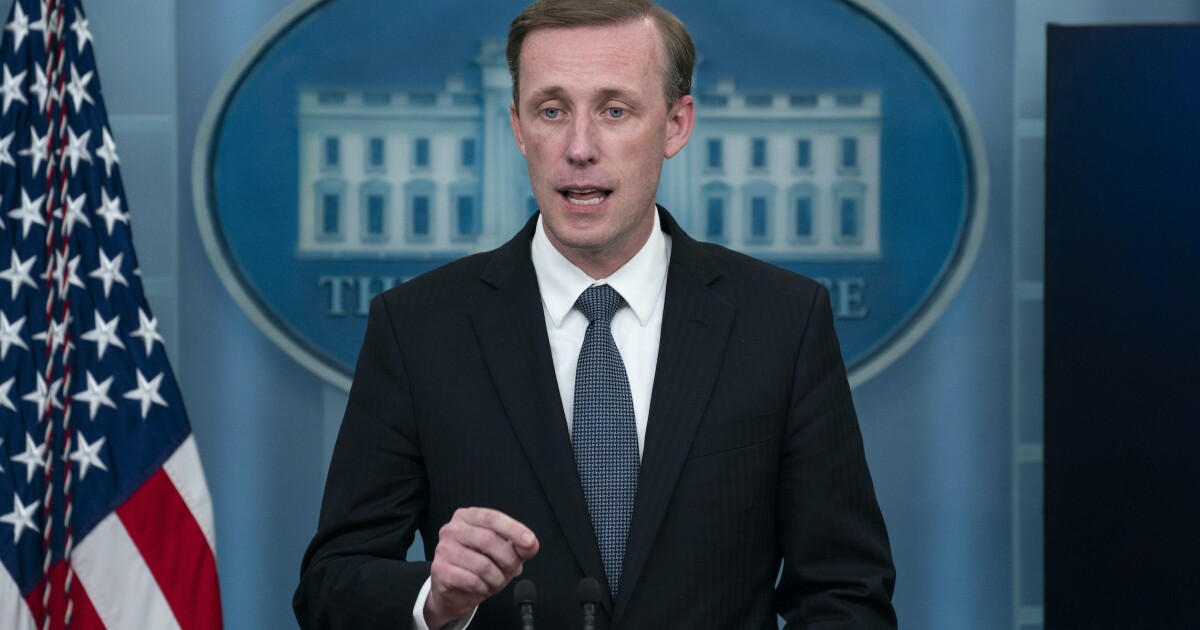

President Joe Biden seeks a defeat of Russia in Ukraine that degrades Moscow’s power over the “longer term” and turns Russian President Vladimir Putin’s aggression into a cautionary tale.
“It is our strategic objective to ensure that Russia’s invasion of Ukraine is not a strategic success for Putin, that it is a strategic failure for Putin,” White House national security adviser Jake Sullivan said Friday at the Aspen Security Forum in Colorado. “And that means both that he be denied his objectives in Ukraine and that Russia pay a longer-term price in terms of the elements of its national power so that the lesson that goes forth to would-be aggressors elsewhere is that, if you try things like this, it comes at a cost that is not worth bearing.”
Sullivan outlined that overarching priority as other senior officials touted the provision of another $270 million in military equipment to Ukraine, which has managed to minimize Russia’s battlefield successes even as the war shifted to terrain more favorable to the invading force. In that context, Sullivan, who was perceived by allies as “afraid of winning” in the first months of the war, acknowledged his optimism that the invasion is deteriorating into a military crisis for Russia.
“And now, we’re in a circumstance in which Russia is facing significant difficulties constituting the kind of force necessary for them to achieve the objectives, which have not fundamentally changed,” Sullivan said. “But the gap between their capabilities and Putin’s objectives has grown with each passing month.”
HOW RUSSIA COULD USE YOUR AUNT’S GENEALOGY HOBBY TO KILL YOU
The successful punishment of Russia could forestall the prospect of a war with China, according to Sullivan. “It’s never as simple as that,” he acknowledged. “I do think that part of our objective in Ukraine has to be able to show strength, resilience, staying power, canniness, capability because that will have some impact on our ability to effectively deter others elsewhere.”
His perspective on the war aligns with the forecasts offered by other members of Five Eyes, the globe-spanning Anglophone intelligence-sharing network. Canadian defense officials published an assessment Thursday that “Russia likely no longer has the military capability to achieve its ambitions in Ukraine,” and a top British intelligence official predicted that Putin’s troops will soon “run out of steam” due to high casualties and low ammunition.
“Our assessment is that the Russians will increasingly find it difficult to supply manpower and materiel over the next few weeks,” U.K. Secret Intelligence Service Chief Richard Moore said Thursday at the forum. “They will have to pause in some way, and that will give the Ukrainians opportunities to strike back.”
Some of those counterstrikes are already underway. Ukraine’s Defense Intelligence Agency published a video on Friday that purportedly showed “a kamikaze drone” strike on a Russian military position near Zaporizhzhia Nuclear Power Plant, a major nuclear power facility where Russian forces reportedly have deployed heavy artillery batteries.
❗ Українські військові ювелірно відпрацювали по позиціях російських окупантів біля Запорізької АЕС.
▪ Використовуючи дрон-камікадзе було знищено 3 рашисти, 12 травмовані. Наметове містечко знищене пожежею, яку довго не могли загасити. pic.twitter.com/tkQfKHxoCX
— Defence intelligence of Ukraine (@DI_Ukraine) July 22, 2022
And an influx of more than a dozen medium-range artillery systems from the United States has allowed Ukrainian forces to savage Russian supply lines.
“Now that the U.S. is giving these long-range artillery pieces, the HIMARS, they’re getting behind the Russian lines and upsetting the command and control and also, you know, making it harder for them to organize themselves,” State Department Undersecretary for Political Affairs Victoria Nuland said in an appearance earlier Wednesday at Aspen.
Those heavier weapons were provided after a period of internal U.S. deliberation that proved painful for Ukrainian troops, which prompted officials in Kyiv to lament the pace and quality of the provisions even as they tout the successes achieved with the incoming arsenal. Sullivan dismissed the idea that the U.S. has “undersupplied” Ukrainian forces, characterizing it as an understandable attitude for Ukrainian officials but one belied by their record-setting assistance.
“The United States’s speed, scope, and scale of military assistance to Ukraine is an absolute testament to the logistical capacity of the U.S. military and, honestly, to the surprising political capacity of the U.S. Congress to come together on a bipartisan basis and put forward the resources to get this done,” he said. “But we have moved billions of dollars of equipment in at what by any kind of reasonable historical analysis would say is lightning speed, and we will continue to do so.”
Sullivan stipulated that the American assistance will stop short of providing the “long-range missiles” that Ukrainian forces seek, citing Biden’s belief that such assistance would represent a step “down the road towards a third world war.” Ukrainian Defense Minister Oleksii Reznikov predicted earlier this week that Biden would greenlight the “long-range weapons … sooner or later” based on his experience with U.S. officials hesitating to arm Ukraine and then reversing course as the war unfolds.
“In November 2021, I was told in Washington, D.C., that we would never get Stingers because that simply wasn’t possible,” Reznikov told the Atlantic Council on Tuesday, referring to the anti-aircraft missiles that helped Ukrainian forces win the battle of Kyiv. “This story was repeated over and over again. When we began to receive artillery, then [multiple-launch rocket systems] … for me, the word ‘impossible’ means ‘possible in the future.’”
Sullivan, for his part, emphasized that the future will show that the U.S. can continue to equip Ukraine for far longer than Putin might hope.
CLICK HERE TO READ MORE FROM THE WASHINGTON EXAMINER
“It’s very important for Putin to understand what exactly he’s up against from the point of view of the United States’s staying power,” Sullivan said as he touted the $40 billion aid legislation. “That can go on, just on the basis of what we have already had allocated to us and resources, for a considerable period of time. And then, I strongly believe that there will be bipartisan support in the Congress to re-up those resources should it become necessary.”






